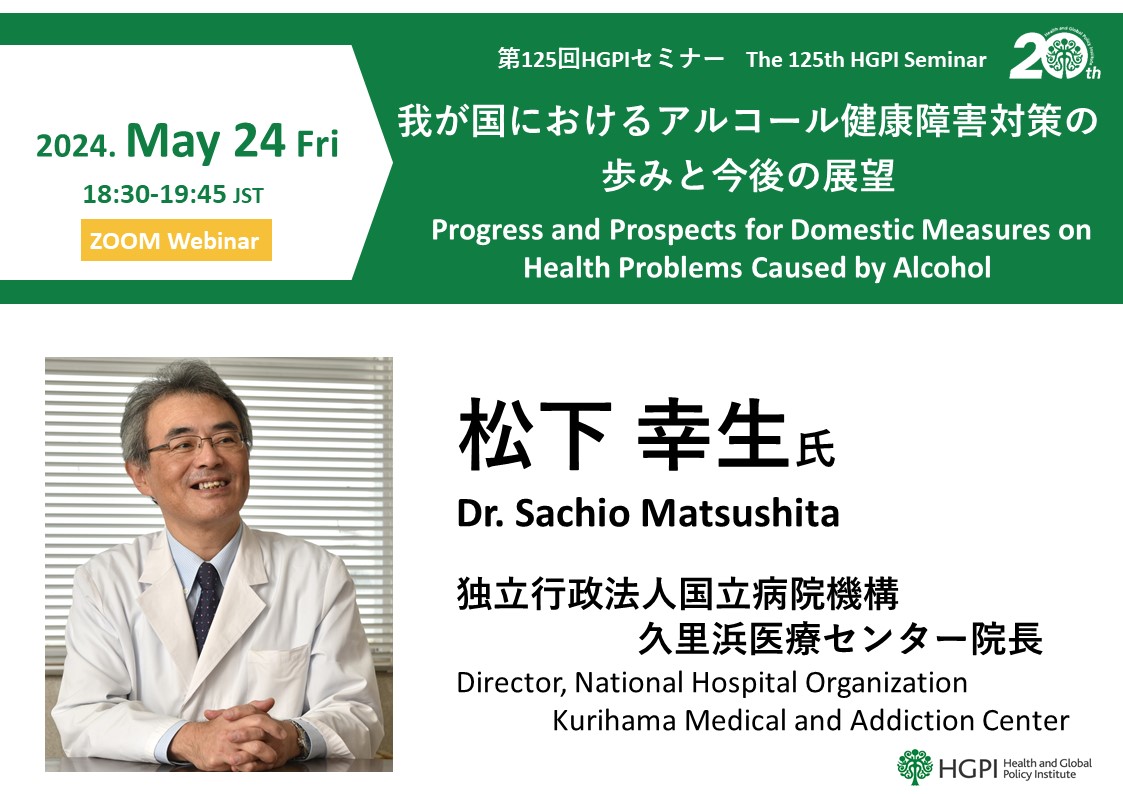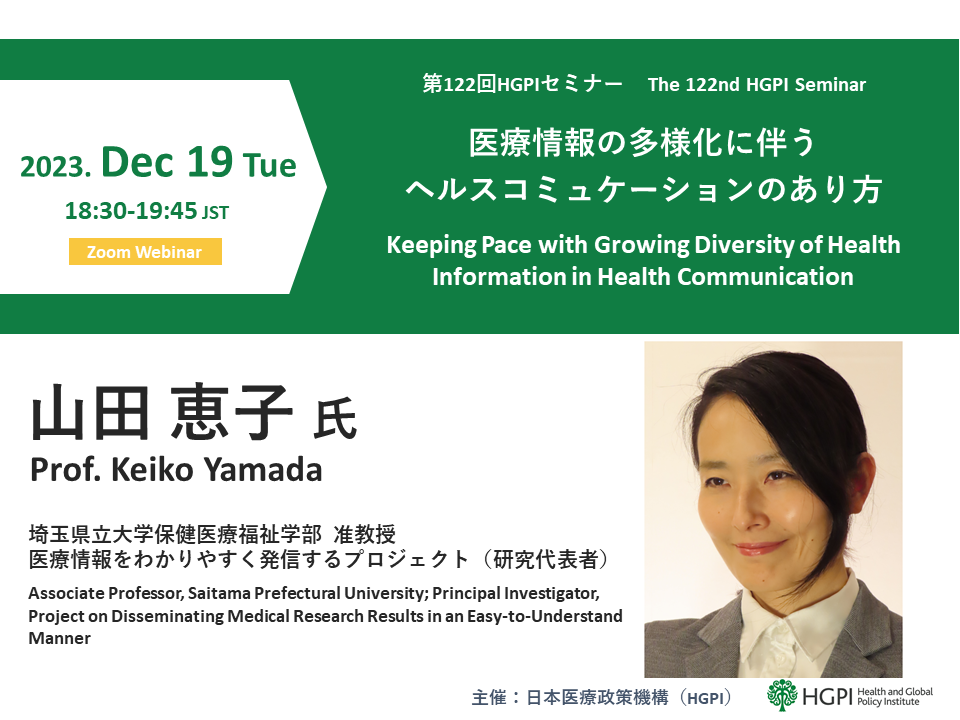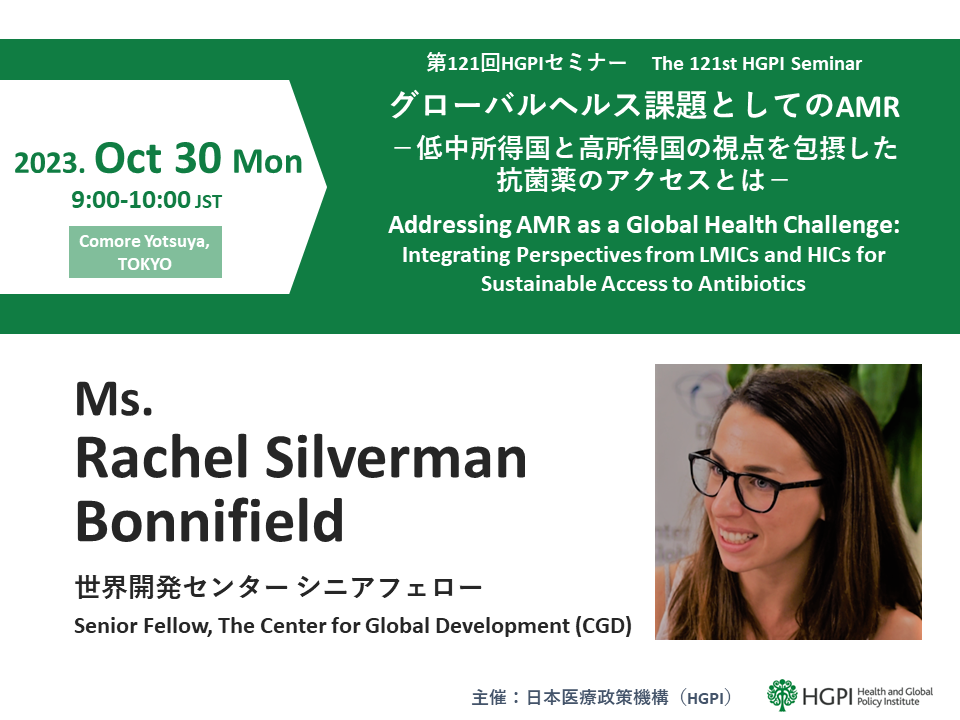[Event Report] The 123rd HGPI Seminar – The Current Situation and Future Prospects for Epilepsy in Japan and Around the World (March 6, 2024)
date : 5/2/2024
Tags: HGPI Seminar, NCDs
![[Event Report] The 123rd HGPI Seminar – The Current Situation and Future Prospects for Epilepsy in Japan and Around the World (March 6, 2024)](https://hgpi.org/en/wp-content/uploads/sites/2/hs123-top-20th_ver.02-1.png)
The 123rd HGPI Seminar featured Professor Kensuke Kawai, President of the Japan Epilepsy Society, who discussed current circumstances surrounding epilepsy in Japan and overseas, as well as past developments in and future prospects for epilepsy policy.
<POINTS>
- Epilepsy is among the most common neurological disorders, but it is difficult to diagnose. Epilepsy treatments are determined according to how the condition is classified.
- Social stigma caused by a history of prejudice and discrimination toward epilepsy has resulted in a “treatment gap” in which people are not connected to treatments despite their availability.
- Patients, their families, healthcare providers, and the government are collaborating in all aspects of epilepsy care, including raising awareness toward epilepsy, improving access to care, and elevating care quality.
- On the international level, the World Health Organization (WHO) has adopted a resolution on epilepsy. Japan is making progress on domestic epilepsy treatment policies, but they must be made even more vigorous in the future.
Epilepsy is classified after taking both disease type and the seizure type are taken into account during diagnosis, after which treatment options are selected
According to the World Health Organization (WHO), over 50 million people worldwide live with epilepsy, making it one of the most common neurological disorders. Epileptic seizures are caused by the uncontrolled electrical activities of nerve cells in the brain. Anyone can develop epilepsy at any age. In addition to epileptic seizures, epilepsy can have various neurophysiological, cognitive, psychological, and sociological effects, and it sometimes carries the risk of early death.
The WHO defines epilepsy as a “chronic disorder of the brain characterized by recurrent seizures” due to excessive electrical discharges in cerebral neurons. There are two major classes of seizures: focal onset, which occurs when a part of the brain is excited; and generalized onset, which occurs when most or all of the brain is excited. Seizures that begin and end in one part of the brain without spreading to both sides do not cause generalized convulsions, making them difficult to recognize as epileptic seizures. These seizures have motor symptoms, such as twitching of the face or limbs; sensory symptoms such as blurred vision; autonomic symptoms such as palpitations ; and symptoms related to memory and emotions, such as anxiety.
Epilepsy is classified by epilepsy type and the seizure type at a given point in time. We must note that these classifications do not always have a 1:1 correspondence. These classifications are used to select antiseizure medications (ASMs) and to determine the indications and methods of surgery. Epilepsy classifications are revised every five to ten years and progress is being made on treatments as new knowledge is incorporated. The estimated prevalence of epilepsy is 0.5% to 1%. In children, it is often congenital. Epilepsy associated with stroke, brain tumors, and Alzheimer’s disease becomes more common among people 65 years of age and over.
Epilepsy is diagnosed using interviews and examinations including EEGs and MRIs. During interviews, physicians basically ask patients, their family members, or someone else close to them about seizure symptoms. The EEG test is used to detect “epileptiform abnormalities” or “epilepsy waves” to consider the possibility of epilepsy. Abnormal waves can sometimes appear in people without epilepsy, and they sometimes do not appear in people with epilepsy. This means that EEGs must sometimes be taken repeatedly and over long periods of time before abnormal waves can be detected. MRI scans are used to detect organic lesions or abnormalities on the brain that cause epilepsy. However, epilepsy is caused by electrical activity, so the presence or absence of lesions detected with MRI may be unrelated to epilepsy. For these reasons, epilepsy is difficult to diagnose and is sometimes misdiagnosed or goes undetected. When epilepsy is suspected, an epileptologist should be consulted as soon as possible to conduct a video EEG test so they can examine brain waves during an actual seizure. However, the number of epilepsy centers and other facilities providing specialized epilepsy testing is limited.
The main goal of epilepsy treatment is to control epileptic seizures, but treatment goals should be established while considering improvements to overall quality of life. These improvements include the control of related disorders such as brain dysfunction and developmental disabilities, as well as support for related disorders that impact social participation and education. Epilepsy treatments include pharmacotherapy, surgery, lifestyle guidance, and rehabilitation.
ASMs prevent seizures by inhibiting abnormal electrical activity in neurons. When using ASMs, increasing the dose can also suppress normal neurotransmission, causing side effects like drowsiness and lightheadedness. As it is vital for these medications to be used appropriately, physicians must provide precise guidance on the use of ASMs and monitor blood levels to ensure they are being taken as instructed. When prescribing ASMs, patients must be provided with sufficient explanations that cover the need to take them for life, factors that can trigger seizures when using ASMs, and the side effects of ASMs. It is also important for patients to be provided with explanations and guidance on items related to daily life, like driving or social welfare programs. ASMs are selected according to the Clinical Practice Guidelines for Epilepsy, but those guidelines are not revised annually, so there is sometimes a delay before they include the newest ASMs. Both new and existing ASMs suppress seizures but do not cure epilepsy, but with fewer side effects and fewer drug interactions, newer ASMs are safer.
Approximately 50% of patients experience seizure freedom with their first dose of their first ASM, but after that, the expected value decreases rapidly. If a second ASM is ineffective, the patient is diagnosed with drug-resistant epilepsy and surgical intervention is considered. Surgical treatment may include removal of the portion of the brain causing epilepsy or the implantation of a device that provides electrical stimulation. While surgical treatment carries a risk of complications, it is less risky than continued seizures, so the use of surgery is expanding around the world. There is also growing use of palliative treatments that aim to reduce seizure frequency and severity as much as possible rather than preventing seizures altogether.
The treatment gap in epilepsy caused by stigma, and efforts that aim to overcome that gap through collaboration among patients, their families, healthcare providers, and the government
The WHO and many countries classify epilepsy as a neurological disorder, but in Japan, it is classified as a mental disorder. There are various forms of administrative support for epilepsy in Japan. Adults are covered by the Medical System for Services and Supports for Persons with Disabilities, the System of Certification for Persons with Psychiatric Disabilities, and the Disability Pension System. Children are covered by the Research Program for the Treatment of Specific Pediatric Chronic Diseases, the Medical Treatment and Education Handbook system, the Special Child Rearing Allowance, and the Welfare Allowance for Children with Disabilities.
Epilepsy has historically been the subject of prejudice and discrimination, and there is social stigma toward the condition. This has resulted in a “treatment gap,” in which people are unable to access treatments despite their availability. This gap exists in both developed and developing countries. Efforts to disseminate health information and raise awareness for epilepsy that should have already advanced in Japan have been hindered by this stigma. This has allowed the lack of knowledge and information about epilepsy to persist unchecked. If a person living with epilepsy is provided with the appropriate treatments and there is nothing preventing safe driving, they can also drive cars. This fact is not fully understood, so society must be provided with accurate information to build understanding toward epilepsy symptoms and the challenges that people living with epilepsy encounter in daily life.
The Japan Epilepsy Society (JES) is one organization that is dedicated to informing the public about epilepsy. JES provides a wide range of the information that people need to understand, diagnose, and treat epilepsy, and is a global leader in this area. In addition to hosting scientific conferences and meetings with councils in each region to share information and promote collaboration, JES also publishes a journal and guidelines, certifies epileptologists and technical specialist physicians, and accredits training facilities and specialized health institutions. JES has over 3,000 members that include physicians from a variety of fields such as pediatrics, psychiatry, neurology, and neurosurgery as well as members who are not physicians. Epilepsy care is classified as psychiatric care as a matter of national health policy, so JES once had a great number of psychiatrists, but there are now more pediatricians. As for groups representing the parties most affected, Japan Epilepsy Association (JEA) fosters societal understanding of epilepsy, engages in social support activities for people living with epilepsy, and conducts surveys, research, and nationwide campaigns aimed at improving epilepsy policy. JEA bases its approach on self-help activities and, as a social movement, emphasizes activities that foster an accurate understanding of epilepsy. JEA has approximately 5,000 members nationwide that include patients and their families as well as physicians and other specialists. JEA also serves as the Japanese branch of the International Bureau for Epilepsy (IBE). As for other players that are active in this area, the Ministry of Health, Labour and Welfare (MHLW) and the Japan Epilepsy Center Association (JEPICA) each play a role in raising awareness, improving care access, and enhancing care quality.
Domestic policies, global trends, and future prospects
Starting in 2015, the MHLW has been advancing a project called “Establishing an Integrated Community Care System for Epilepsy” which aims to achieve an equitable epilepsy care system throughout Japan. At its launch, eight health institutions across Japan were designated as core epilepsy hospitals. These hospitals have served as the foundation of efforts to reinforce collaborative systems in their respective regions. Currently, 29 prefectures have hospitals that have been designated as collaborative centers for epilepsy care. While there has been progress in gradually expanding this system, compared to other diseases that affect similar numbers of people, there is still little financial support for epilepsy. Another issue is the lack of awareness of this system. A survey of physicians practicing outside of urban areas found that awareness of epilepsy centers outside of urban areas is low.
In 1997, the WHO conducted an awareness campaign called “Out of the Shadows” to shine a light on epilepsy and raise awareness that it is a common, treatable condition that should not have a treatment gap or be the subject of stigma, prejudice, or discrimination. The WHO Resolution on the Global Burden of Epilepsy was approved at the 2015 World Health Assembly, which sent a message on ensuring understanding of epilepsy and promoting social acceptance for people living with epilepsy. Later, the Intersectoral Global Action Plan on Epilepsy and Other Neurological Disorders (IGAP) was adopted at the World Health Assembly in 2022. The global targets for 2031 set by IGAP include increasing epilepsy service coverage by 50% from 2021 coverage for all countries, and developing or updating legislation to promote and protect the human rights of people with epilepsy in 80% of countries. It also set an objective called the “90-80-70 Cascade Target for Epilepsy.” This target aims to ensure that 90% of patients are aware that their condition is treatable; that 80% have access to affordable, appropriate, and safe ASMs; and that 70% will achieve adequate seizure control.
Of the six regions of the International League Against Epilepsy (ILAE), Asia has both the largest population and number of people living with epilepsy. As many countries in Asia have significant treatment gaps, the Asia Oceania Chapter of ILAE is engaged in a variety of educational and awareness-raising activities. For example, many countries in Asia are lagging behind in providing surgery to people with drug-resistant epilepsy, so the Asia Oceania Chapter’s Epilepsy Surgery Task Force provides guidance in real-world care settings or hosts physicians from overseas to provide guidance on surgery in Japan. A Japanese EEG manufacturer is also providing training on diagnostic EEG in Indonesia.
Every day, advances are being made in R&D on new ASMs, and use of Japan’s first ASM is growing around the world. The introduction of robot-based testing methods to determine the safest and fastest surgical procedures means advancements are being made in testing. On top of this, diagnosis and treatment methods utilizing new technologies are rapidly developing and spreading globally. Expectations are high for Japan to expand policy support systems for more vigorous activity in diagnosis and treatment in the field of epilepsy from R&D to real-world application so these new technologies can be introduced promptly in Japan, as well.
[Event Overview]
- Speaker: Prof. Kensuke Kawai (Professor, Department of Neurosurgery, Jichi Medical University; President, The Japan Epilepsy Society)
- Date & time: Wednesday, March 6, 2024; From 18:30 to 19:45 JST
- Format: Online (Zoom Webinars)
- Language: Japanese
- Participation fee: Free
- Capacity: 500 participants
■Speaker profile:
Prof. Kensuke Kawai (Professor, Department of Neurosurgery, Jichi Medical University; President, The Japan Epilepsy Society)
Professor Kensuke Kawai is a neurosurgeon specializing in epilepsy and conducts research on brain function. He previously served at Tokyo Metropolitan Neurological Hospital, the University of Tokyo, and NTT Medical Center Tokyo before assuming his current position at Jichi Medical University in 2016. In addition to improving epilepsy treatment in Japan in his capacity as President of the Japan Epilepsy Society, he has worked to expand community epilepsy care as Director of the Jichi Medical University Hospital Epilepsy Center, which is a collaborative center for epilepsy care in Tochigi Prefecture. Professor Kawai also served as Board Member at the Asia and Oceania chapter of the International League Against Epilepsy, where he chaired the Epilepsy Surgery Task Force. Recently, he has been working to support efforts to establish an epilepsy care system providing epilepsy surgery in Mongolia.
日本語
Top Research & Recommendations Posts
- [Policy Recommendations] Developing a National Health and Climate Strategy for Japan (June 26, 2024)
- [Announcement] A Turning Point Towards Building Green Healthcare Systems (June 5, 2024)
- [Research Report] Building a Mental Health Program for Children and Measuring its Effectiveness (June 16, 2022)
- [Research Report] The 2023 Public Opinion Survey on Satisfaction in Healthcare in Japan and Healthcare Applications of Generative AI (January 11, 2024)
- [Research Report] 2019 Survey on Healthcare in Japan
- [Policy Recommendations] Establishing an Integrated Care System for Pain from the Perspectives of People with Lived Experience (March 29, 2024)
- [Research Report] Survey of Japanese Physicians Regarding Climate Change and Health (December 3, 2023)
- [Announcement] Participation in an International Survey on Brain Health for Young People “The Next Generation (NextGen) Brain Health Research Program” (July 1, 2024)
- [Policy Recommendations] Obesity Control Promotion Project 2023 “The Next Steps for Engaging and Cooperating with Patients, Citizens, and Communities for Implements of Obesity Control Measurements” (April 8, 2024)
- [Japanese Version Release] “Call for Actionable Steps in Response to the Rising Threat of Antimicrobial Resistance (AMR)” (July 3, 2024)
Featured Posts
-
2024-07-01
[Registration Open] Meaningful Involvement Promotion Project Online Expert Meeting “Shaping the Future of Health Policy with People with Lived Experience and Citizens” (July 26, 2024)
![[Registration Open] Meaningful Involvement Promotion Project Online Expert Meeting “Shaping the Future of Health Policy with People with Lived Experience and Citizens” (July 26, 2024)](https://hgpi.org/en/wp-content/uploads/sites/2/HGPI_20240726_Shaping-the-Future-of-Health-Policy-with-People-with-Lived-Experience-and-Citizens.jpg)
-
2024-07-17
[Event Report] Non-partisan Diet Member Briefing – 30-minute Health Policy Update: “Towards Overcoming Kidney Disease: Strengthening Measures Against CKD” (June 7, 2024)
![[Event Report] Non-partisan Diet Member Briefing – 30-minute Health Policy Update: “Towards Overcoming Kidney Disease: Strengthening Measures Against CKD” (June 7, 2024)](https://hgpi.org/en/wp-content/uploads/sites/2/HGPI_240717_FY2024CKD_DietMemberBriefing_eyechatch.png)
-
2024-07-18
[Registration Open] (Hybrid Format) Kidney Disease Control Promotion Project Public Symposium “Establishing Kidney Disease Control Measures with Patient, Citizen, and Community Engagement and Collaboration” (August 28, 2024)
![[Registration Open] (Hybrid Format) Kidney Disease Control Promotion Project Public Symposium “Establishing Kidney Disease Control Measures with Patient, Citizen, and Community Engagement and Collaboration” (August 28, 2024)](https://hgpi.org/en/wp-content/uploads/sites/2/HGPI_240712_FY2024CKDsymposium-1.jpg)
-
2024-07-22
[HGPI Policy Column] No. 44 — From the Planetary Health Policy Project, Part 9 “Connecting Climate Minds: the Intersection of Climate Change and Mental Health”
![[HGPI Policy Column] No. 44 — From the Planetary Health Policy Project, Part 9 “Connecting Climate Minds: the Intersection of Climate Change and Mental Health”](https://hgpi.org/en/wp-content/uploads/sites/2/column-44-top.png)
-
2024-07-23
[Registration Open] (Webinar) HGPI Special Seminar “The Emerging Threat of Antifungal Resistance — Considering Infectious Diseases Caused by Mold and Measures to Combat Drug Resistance” (August 23, 2024)
![[Registration Open] (Webinar) HGPI Special Seminar “The Emerging Threat of Antifungal Resistance — Considering Infectious Diseases Caused by Mold and Measures to Combat Drug Resistance” (August 23, 2024)](https://hgpi.org/en/wp-content/uploads/sites/2/HGPI_240719_HGPISeminar_AMR_Eyecatch_REV2.png)







